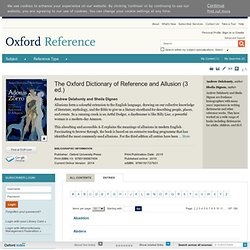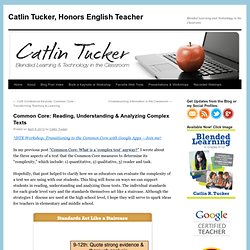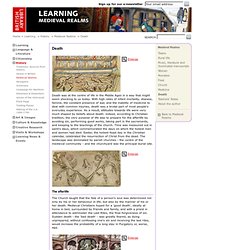

English III. English IV. College/Career PORTFOLIO. G.U.M.P. and stuff. Reading for the Love & Learning. Amnesty. Gladwell. Shakespeare. Critical Inquiry. Research. Avoiding Plagiarism. How and Why We Read: Crash Course English Literature #1. The Oxford Dictionary of Reference and Allusion Oxford Reference. Allusions form a colourful extension to the English language, drawing on our collective knowledge of literature, mythology, and the Bible to give us a literary shorthand for describing people, places, and events.

So a cunning crook is an Artful Dodger, a daydreamer is like Billy Liar, a powerful woman is a modern-day Amazon. This absorbing and accessible A-Z explains the meanings of allusions in modern English. Fascinating to browse through, the book is based on an extensive reading programme that has identified the most commonly-used allusions. For the third edition all entries have been reviewed, revised, and thoroughly updated to ensure the consistency of coverage of allusions and references. New to this edition is the inclusion within each entry of a short summary definition for the allusion or reference, ideal for quick reference, and at least one illustrative citation from a wide range of source materials in almost every entry.
Bibliographic Information. Common Core: Reading, Understanding & Analyzing Complex Texts. *ISTE Workshop: Transitioning to the Common Core with Google Apps – Join me!

In my previous post “Common Core: What is a ‘complex text’ anyway?” I wrote about the three aspects of a text that the Common Core measures to determine its “complexity,” which include: 1) quantitative, 2) qualitative, 3) reader and task. Hopefully, that post helped to clarify how we as educators can evaluate the complexity of a text we are using with our students.
This blog will focus on ways we can support students in reading, understanding and analyzing those texts. The individual standards for each grade level vary and the standards themselves act like a staircase. . * Reading Literature Standards. Annotations Each year, I have students enter my room who claim to hate reading. Annotations are not a new strategy, but few, if any, of my incoming 9th grade students have ever been taught how to annotate. Highlighting tips: Annotation shorthand: ? Reading: The Core Skill:The Challenge of Challenging Text. Mondofacto. Teaching Screenagers:Too Dumb for Complex Texts? Back in September 2008, some 3 million people in the United States became college freshmen—the largest cohort ever.

But the weeks before school started brought a setback. The students took a placement test, and many found that they probably wouldn't be able to handle the work to come. If they were to enroll in a regular calculus or freshman composition course, chances are they would fail. They had graduated from high school, but they didn't have the knowledge and skills to tackle readings, tests, and papers at the next level. So the college assigned these freshmen to a remedial unit in math, reading, or writing—a precollege course for no credit that aimed to send them into spring semester ready to earn grades of C or higher. Ready—or Not? That's the fate of 43 percent of students at two-year public colleges and 29 percent of students at four-year public colleges (Strong American Schools, 2008; U.S.
It shouldn't happen. Will more technology in high school classrooms help? References U. SEVEN STRATEGIES.pdf. Death. Death was at the centre of life in the Middle Ages in a way that might seem shocking to us today.

With high rates of infant mortality, disease, famine, the constant presence of war, and the inability of medicine to deal with common injuries, death was a brutal part of most people's everyday experience. As a result, attitudes towards life were very much shaped by beliefs about death: indeed, according to Christian tradition, the very purpose of life was to prepare for the afterlife by avoiding sin, performing good works, taking part in the sacraments, and keeping to the teachings of the church. Time was measured out in saint's days, which commemorated the days on which the holiest men and women had died. To This Day Project - Shane Koyczan.